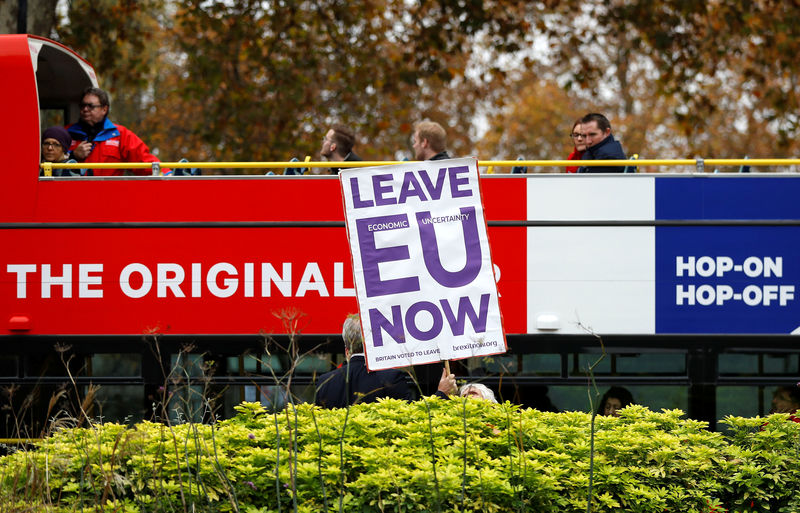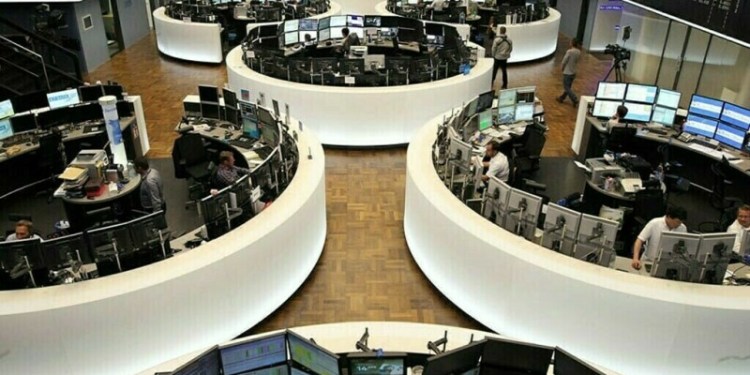 © Reuters. A pro-Brexit campaigner holds a placard as a tourist bus passes by in Westminster London
© Reuters. A pro-Brexit campaigner holds a placard as a tourist bus passes by in Westminster LondonBy Kylie MacLellan and William James
LONDON (Reuters) – British Prime Minister Theresa May will seek to win support from business leaders for her contentious draft European Union divorce deal on Monday as dissenters in her own party scrambled to trigger a leadership challenge.
May has had a tumultuous few days since unveiling her deal on Wednesday last week, with several ministers, including her Brexit minister, resigning and some of her own members of parliament seeking to oust her.
The British leader has vowed to fight on, on Sunday warning that toppling her risked delaying Britain’s EU exit, and has said the future partnership agreement will help ensure the government delivers on the 2016 Brexit vote.
The EU is due to hold a summit to discuss the deal on Nov. 25.
May will defend her deal in a speech to the CBI business lobby group’s annual conference on Monday, saying Britain would embark on an intense week of Brexit negotiations to try to thrash out the details of its outline future relationship with the EU.
“We now have an intense week of negotiations ahead of us in the run-up to the special European Council on Sunday,” May will say, according to advance extracts.
“During that time I expect us to hammer out the full and final details of the framework that will underpin our future relationship and I am confident that we can strike a deal at the council that I can take back to the House of Commons.”
More than two years after the United Kingdom voted to leave the EU, it is still unclear how, on what terms or even if it will leave as planned on March 29, 2019 with business leaders fearful that Britain could leave the bloc with no deal in place.
May will say the withdrawal agreement set out last week, which has been strongly criticized by lawmakers on both sides of the EU debate meaning it will struggle to win the backing of parliament, is a good deal for Britain.
However, Brexit-supporting rebels in her own Conservative party who believe the deal will leave Britain in indefinite subjugation to the EU are attempting to trigger a confidence vote in her leadership.
To prompt such a vote, 48 of her Conservative lawmakers must submit a letter to the chairman of the party’s so-called 1922 committee, Graham Brady who said on Sunday the 48 threshold had not yet been reached.
The Sun newspaper said the rebels were six letters short but one of those calling for May to go said Monday would be a day of reckoning.
“This is absolutely the day at which we stand at the bar of history on this,” Simon Clarke told BBC radio, adding “this day must be the point at which … action is taken”.
Critics like Clarke say May’s deal risked dividing the United Kingdom by aligning Northern Ireland more closely with the EU’s customs rules than mainland Britain.
MAY “DRIVING SHIP AT THE ROCKS”
The DUP, a small Northern Irish party which props up May’s minority government, has threatened to pull its support if the backstop means the province is treated differently from the rest of the United Kingdom.
“If we continue with this plan we are simply not going to have a government because the clear threat it poses to the integrity of the union is something which our colleagues the DUP will simply put up with,” Clarke said. “It is quite clear to me that the captain is driving the ship at the rocks.”
Also speaking at the CBI conference, opposition Labour leader Jeremy Corbyn will describe the deal as “a botched, worst-of-all-worlds deal which is bad for Britain, leaving the country in an indefinite halfway house without a real say”.
Corbyn, who has said his party will not support May’s deal when parliament is asked to vote on it, will say Labour’s plan for Brexit would include a new comprehensive and permanent customs union, and a “strong single market relationship”.
“The government is trying to force a bad deal that doesn’t meet our country’s needs by threatening us all with the chaos and serious damage to our economy of a no deal outcome,” he will say. “The Prime Minister knows that no deal isn’t a real option. Neither the cabinet nor parliament would endorse such an extreme and dangerous course.”
May will tell the business leaders that the deal will allow Britain to control immigration, concerns over which were a key driver behind the Brexit vote.
“It will no longer be the case that EU nationals, regardless of the skills or experience they have to offer, can jump the queue ahead of engineers from Sydney or software developers from Delhi,” she will say.
“We want an immigration system for the future that everyone can have confidence in. Yes, a system that works for business. One that allows us to attract the brightest and the best from around the world, more streamlined application and entry processes.”
Source: Investing.com





























